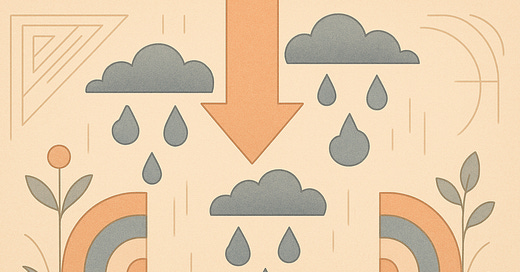We’re sorry there’s no A Couple Minutes this morning - we were up late watching the Florida Gators win the NCAA National Championship!!!! It’s great to be a Florida Gator! Okay, back to business.
Douglas first became one with The Platform Formerly Known as Twitter during the pandemic. He’d been growing his presence there for several years, but not until the shutdowns and lockdowns and hunkerdowns sent shockwaves through the global economic system did he go all in.
Twitter took over his life. He thirsted for the dopamine of making his clever quips go viral—or at the very least, hit the metrics he deemed respectable enough. He made new internet friends, some of whom I struggled to confirm were real people, and he spent the majority of his time DMing with them when he wasn’t working. Round numbers became milestones that carried an illusory meaning I felt obligated to acknowledge. I celebrated them with homemade balloon arches and even a giant “Card My Yard” display for the lawn, in part for my own amusement but also to point out the absurdity of it all. Although I couldn’t care less, joining the discourse felt like the best way for me to see what he was seeing.
Looking back, I realize, this was his cope. As a financial professional living through yet another unprecedented moment of chaos in the financial markets (our first being The Great Recession, a memorable way to start our careers), and as a businessowner forced to upend the entire way he works, Douglas slid himself into a space where bite-sized humor became the best way for him to deal with what he was experiencing. He didn’t think what was happening was funny. Humor was just the first way he figured out how to deal with it.
Humor was not how I coped. Not then. Anyone close to me knew that I was finding very few reasons to laugh. Everything felt heavy and unduly significant, from securing our paper goods and provisions to deciding how close was too close for even a benign interaction. The financial markets were not my top concern. I was concerned with trying to maintain a rhythm to our lives that sheltered our young children from the pressure building inside of us, which they didn’t deserve to bear the brunt of. My cope was doing things—anything. I painted rocks, painted sneakers, painted murals on our walls, tie-dyed, planted, re-potted, repurposed, sliced, and chopped. I started writing again. I started to run. We made a lot of desserts. Terms like “the new normal” were built on the backs of mothers like me, whose children believed for a time that a Saturday should start with kneading dough for fresh bread. Maintaining busyness made me feel like I was protecting myself and them. It made me feel like I was moving when there was nowhere to go.
These were our lanes. The deeper we leaned into them, the more we masked what was actually worrying us. And when that would come up, it flared up. I would fight with him about Twitter and his phone, but it was Never. About. The Phone. It was about not knowing where he was.
When we talked about that time for this newsletter, Douglas said, he kind of felt the same way about me. I was so deep in my neuroses. He couldn’t fully comprehend the correlation between me doing those things and the ground feeling like swampland under my feet. We both found these very proximate ways to soothe our anxieties during an insane time for so many people, but they were inadequate substitutes for coming together to help each other through it.
It’s not a stretch to draw parallels between then and now.
The imminent threat of Trump’s tariffs is sending shockwaves through the global economy once more. Without pause or intervention, we could be on the precipice of the first self-imposed recession in U.S. history. I’m tethered to the financial services industry through my job, our friends and colleagues, and of course, my husband. In these particular echo chambers, it feels like everyone’s deploying their best advice, preparing communications to clients, responding to media requests, and prophesizing about the impact of what’s going on and what will happen four steps down the road. Of course, this all feels incredibly significant to them, and it is significant. So many will feel the pain in their portfolios if they’re on the cusp of reaching a major financial goal, and even more businessowners and workers will get hit with direct and indirect impacts from these tariffs.
There will be pain—I know, and I’ve been told. If this is all giving you End of Times vibes, allow me to be the Non-Financial Voice of Reason to assure you that you are neither right nor wrong for experiencing a high degree of stress right now. However you feel, you feel.
But my experience this past week has been different than that. Not to sound as blissfully ignorant as Victoria Ratliff in The White Lotus, but there are things that have happened and continue to happen in this geopolitical climate that make me feel more unmoored than our trade policies. I admit this at the risk of you shaking your heads at me here in this newsletter on the very topic of money, and knowing full well this may not always be the case.
My point is that to your spouse, this may not be the moment that feels like the End of Times. To your kids, it feels like Tuesday.
At one point or another, we have all been expected to move forward with our daily lives under the cloud of a real—or perceived—existential threat to our emotional, physical, or financial security. It’s a sad truth but one that’s real as day. We’ve done it before, and we’ll do it again. That’s why we find ways to cope: to diffuse our fears and put on our bravest faces, if not for ourselves, then for those we love.
Under the umbrella of these uncertain times, there’s a good chance that you or your partner might end up in a bad place. You might end up there at different moments and for acutely different reasons. But when you know each other’s coping behaviors, you can recognize them as a signal for when there might be more simmering beneath the surface. And when it comes to those behaviors, it behooves you both to not bury yourself in them. Your partner deserves a chance to help you, and you deserve to be helped.
No one feels good not knowing what will happen. But if you zoom out, none of us really know what will happen. We never do.
For the most part, I think, my husband and his friends would tell you to stay the course. But I’ll be the one to tell you to stay the course with each other.
I think we could all use a sanity check. What’s bothering you most right now, and how are you coping? Let us know.
Douglas has always claimed that he comes from a long line of auctioneers. Until Saturday night, when he emceed the school fundraiser and led a fiery live auction, I never believed it. But when I tell you he absolutely crushed it, I am not exaggerating. This guy was born to entertain, and I was one proud wife!
TJA in the news
It’s all tariff talk right now. For CNBC, Douglas shared a bit of what he’s telling clients.
Shameless plugs
Are you a brand or business interested in reaching The Joint Account’s 14,000+ subscribers?
Would your organization benefit from having us talk about love and money?
We’d love to hear from you.
And don’t forget, our forthcoming book, Money Together: How to find fairness in your relationship and become an unstoppable financial team, arrives in October 2025. You can pre-order your copy now!
Find us on social: @dougboneparth + @averagejoelle :)
The content shared in The Joint Account does not constitute financial, legal, or any other professional advice. Readers should consult with their respective professionals for specific advice tailored to their situation.







I am older than your target market. Retired, I am in 60s, married, two dogs, and no big income. In fact we are now living on our retirement funds. Is it hard? We had to make some hard decisions but it worked out. I don't know if it is sheer dumb luck, God, or just doing the right thing at the right time. No one really knows what the future holds, neither do I.
As a senior now, and if you can bear to hear what I am saying, it might help you. Are things scary? Yes. Will this be the new normal, scary times, unsettled emotions, changes that come out of nowhere? What about my education and my kids? How do I prepare for what life throws at me? How can I be safe, secure and loved. Have meaningful relationships and thrive. silence. you are doing everything now that you can do. You have a reserve within yourself that you draw from. You talk to friends, family and others to not only check in but learn from each other. There are lots of people who did not have great parents in the 1970s. They got public education, maybe did college, (if they were smarter) they got involved in a trade. The interest rates were roughly 18% on a mortgage. It was a time when there were pensions, companies saw their success not only from their product but from people who made, designed, and manufactured the item or service. Gas was under a $1, but there was inflation and salaries did not match the rate of inflation. Food was expensive and we had gas guzzling cars! Land yachts, we called them. Our fathers were in the steel industry, manufacturing, automotive, farming. Often whole families made do. Credit cards were unheard of and most people just had checking and savings accounts. Scary right? But we survived. You will survive. You adapt, you join a food co-op, you buy a used or less expensive car. You do a staycation. You do a day trip. You and your family get together to see if you can do a beach week if you all chip in. You look at your spouse and say I love you, you realize that people are pushing your buttons. why? because they can. When things go bad you have the skills to handle it. You talk to friends, talk to an elderly person about how they survived the bad days. You look at your kids and think that they, with your help, will learn that not everyone gets a prize, everyone falls down and skins their knees and they get up and play some more. You have Friday night pizza and games. Saturday night friends over, clean when you can. Sunday prepare for the week ahead. Rinse and repeat.
We are all entering a new phase of working. Less companies and more independents. Its okay, you are not alone and this isn't the apocalypse. Just a massive shift in our lives. We did it in the 1970-1980s. it is happening again, the difference is that we have news, doom scrolling access at our fingertips. It is nonsense.
I have known two doom and gloom people in my life. One was my grandmother who predicted that there was going to be one world order, that everything would collapse and we would be on the street. She was wrong/ She wanted here daughters to never marry, never have kids, or be successful. She wanted her daughters home to take care of her. It was never going to happen because the daughters left because of doom and gloom. She predicted the death of every husband her daughters married. Never happened. But she got off on fear, of control, and make everyone need her. when she died she died alone, without her family around and there was no fighting or arguments about who wanted what. There however was a sigh of relief because no more doom and gloom.
The second person was a co worker. His outlook on the world, current events, stock markets, and just daily living were toxic. I would come home in a real state thinking nothing was going to get better. My husband would then go to the computer and show me positive events, remarked that the stock market went up and down, and we recovered. Doom and gloom people have been around forever. They make life very scary but you are smarter because you know it is a phase and you have resilience, intelligence, adaptability and know things will work out in the end.
You are smart, really smart.